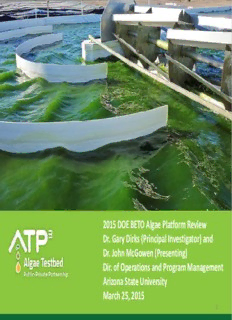
ATP3 Algae PDF
Preview ATP3 Algae
2015 DOE BETO Algae Platform Review Dr. Gary Dirks (Principal Investigator) and Dr. John McGowen (Presenting) Dir. of Operations and Program Management Arizona State University March 25, 2015 1 Goal Statement Mission: Establish a sustainable network of regional testbeds that empowers knowledge creation and dissemination within the algal R&D community, facilitates innovation, and accelerates growth of the nascent algal biofuels and bioproducts industry. Goals: - Increase stakeholder access to high quality, outdoor cultivation and laboratory facilities - Support DOE’s techno-economic, sustainability, and resource modeling activities - Help to close critical knowledge gaps and inform robust analyses of the state of technology for producing algal biofuels and bioproducts Quad Chart Overview Timeline Barriers • Project start date: 2/1/2013 – AFt-B Sustainable Algal Production: Existing data on the productivity and environmental effects of biomass – Pre-Award (at risk) 11/12-1/13 feedstock production systems…are not adequate • Project end date: 1/31/2018 – AFt-E Algal Biomass Characterization, Quality, and • Percent complete: 55% Monitoring: Physical, chemical, biological, and post- Budget harvest physiological variations in harvested algae are not well researched or understood Total project cost: $17.05M – AFt-C Productivity and robustness of algae strains against DOE Commitment ($15M) perturbations such as temperature, seasonality, predation, and competition…not well understood. • Open Collaborative Testbeds: $7.3M Partners – DOE share: $5.25M – Contractor share: $2.06M ASU (AzCATI) (45%) National Renewable Energy Laboratory (9%) • High Impact Data: $9.75 Sandia National Laboratories (10%) – DOE share: $9.75M Cellana (12%) – Contractor share: N/A Cal-Poly (5%) FY 13 Costs FY 14 Costs Total Planned Georgia Tech (5%) Funding (FY 15- Touchstone Research Laboratory (4%)* Project End UTEX (5%) Date Florida Algae (2%) DOE Funded $4,581K $4,804K $5,615K Commercial Algae Management (2%) Valicor Renewables (2%) Contributed $560K $750K $750K Open Algae (1%) 3 * No longer part of ATP3 as of 8/14 Project Overview: 3 ATP national open test bed The formation of the Algae Testbed Public-Private Partnership leveraged the existing resources at AzCATI and our partner sites. The network represents a collaboration of industry, laboratory, and educational facilities across nation. ATP3 aims to convene algae stakeholders to facilitate opportunities and progress more rapidly to commercialization. 44 ATP3’s Two Main Objectives Collaborative Open Testbeds • Establish network of facilities for the algal research community and increase stakeholder access to real-world conditions for algal biomass production. • Accelerate applied algae research, development, investment, and commercial applications for biofuel and bioproduct feedstock production. High Impact Data from Long Term Algal Cultivation Trials • Design and implement a unified experimental program across different regional, seasonal, environmental and operational conditions comparing promising production strains at meaningful scales. • Data made widely available to the TEA/LCA and overall research community allowing for a robust analysis of the state of technology. 5 Project Management: Work Breakdown Structure Task 1: Collaborative Open Test Bed Task 2: High Impact Data (Cont.) 1.1 Operations - Assemble a network of 2.2 Long Term Cultivation Trials - geographically diverse sites to carry out Generating data to support DOE’s TEA, LCA, integrated testbed operations. resource modeling and make widely available to the community 1.2 Business Development and Marketing - establish a sustainable network of regional 2.2.1 and 2.2.2 Unified Field Studies (UFS) testbeds that can continue beyond initial program and Advanced Field Studies (AFS) – design, validate and implement experimental 1.3 Training and Education - Develop and framework for cultivation trials. deploy high quality training and education 2.2.3 TEA/LCA – update base case to programs represent current SOT first with ATP3 Task 2: High Impact Data UFS/AFS data and later with customer data 2.1 Setting Standards - Identify and implement current best practices across our partner sites 2.2.4 Dynamic Modeling – implement and validate existing physics-based computational with a strong focus on continuous improvement fluid dynamics model to enhance predictive - 2.1.1 Harmonized methods and metrics (Analytical capability for productivity (strain, location, AND Production) system, scale) - 2.1.2 Data Management (SDMS) - 2.1.3 Advanced Diagnostics - 2.1.4 Real Time Monitoring 6 Project Approach: Project Timeline ATP3 Phase 1: 1. Months 1-12: Coordinate mobilization of partnership and initiate work to perform both functions – Go/No Go for Phase 2 (January 2014). Major Milestones: - ATP organization, systems and processes established - Methodologies harmonized across all partner sites - Initial cultivation trial and detailed experimental planning completed - Biomass stocks available Phase 1 Critical Success Factors - Harmonized systems and operational protocols verified and validated and experimental framework for Phase 2 defined - Facilities use agreement boiler plate (MTA/NDA/IP) in place and stakeholder access to test bed network established with customers using 1 or more of the test bed sites - First call for Scholarship/Innovator complete and projects selected for review - Biomass stocks available for sale or for support projects 7 Project Approach: Project Timeline (cont.) ATP3 Phases: (Currently in month 25) 2. Months 13-36: Long term cultivation trials implementation and building customer base as a user facility – Go/No Go for Phase 3 Major Milestones/Critical Success Factors at end of Phase 2: - Cultivation trials complete/data generated - Data distribution implemented/data made widely available - State of algal biofuels technology design report completed - Capability of testbed network to serve stakeholder community demonstrated 3. Months 37-60: Sustainable Testbed Operations. Major Milestones/Critical Success Factors: - State of algal biofuels technology design report updated with customer data - Value network validated and funding secured to sustain network in out years 8 Team Structure and Management Approach • Bi-Weekly Exec Team/Coordination Team telecoms • Weekly full team site calls (cultivation trial progress): • Monthly technical presentations webinars (AdobeConnect) • Ad hoc data review/sharing with UA RAFT and other stakeholders (at least every 6 months) • Annual all-hands face to face meeting • Multiple site visits (on going validation) by Operations Leads • SharePoint for internal team document storage/sharing • Secure data repository w/public data pushed to OpenEI.org • ATP3.org public facing website (LAPS 9 Technical Accomplishments, Progress and Results 10
Description: